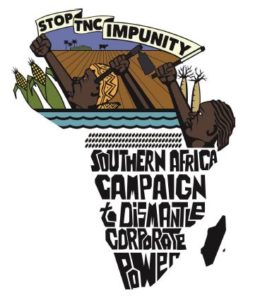The voices of communities in Southern Africa that are ignored by governments and transnational corporations are echoed in the Jurors’ Statement, delivered on the occasion of the second hearing of Permanent People’s Tribunal on transnational corporations in Southern Africa.
The Permanent Peoples’ Tribunal is a public opinion tribunal that is independent from state authorities. Its work is based on the principles of the Universal Declaration of the Rights of Peoples proclaimed in Algiers in 1976. The tribunal applies international human rights law to the cases presented before it.
The 2nd session took place in August 2017, within the Southern African People’s Solidarity Network’s annual People’s’ Summit. During two days, 7 communities and activists from a range of movements throughout Southern Africa presented cases against transnational corporations that are through their predatory activities violating the human rights of local communities and workers and with equal impunity destroying the conditions to clean and sustainable environments.
The cases were presented at the Women’s Jail at Constitutional Hill, Johannesburg from 17 – 18 August in front of an audience of activists from a range of movements throughout Southern Africa and seven distinguished international jurors. Find the full list of jurors here.
The jurors went through a rigorous process of deliberations and have produced a cogent statement that highlights issues of social disintegration, the destabilization of local communities, the effects of illicit financial flows, land grabbing and also the environmental costs that communities have to pay at the hands of TNCs.
The statement expands on the matter of illicit financial flows by stating that:
“With the collusion of host governments TNCs are able to avoid taxation through a number of opaque mechanisms that prevent transparency and accountability… Off-shore companies use the double taxation treaty to avoid paying taxes in the country where they actually conduct their business operations and where their actual income is generated… This deprives countries of vital income streams that could be used for development and poverty eradication.”
Land grabbing is major problem that indeed leads to the dispossession of communities and to disruption of livelihoods which ultimately brings destruction to society and the environment.
“Mining communities repeatedly testified that the land is wed to their lives. Evidence brought before the PPT suggests that the land rush in Africa is rapidly turning land grabs into a continent grab.”
The statement also addresses the ways governments and TNCs violate the communities’ right to say no, through the lack of free prior and informed consent.
It further highlights how the entry of TNCs into Southern African countries is threatening peoples’ sovereignty, social cohesion and economic sustainability.
“The entry of transnational corporations into mining, food production and agro-industries in Southern African countries is further transforming patterns of ownership and control over natural resources. The resulting spatial and economic displacement is disrupting their livelihoods, security and sovereignty. The emerging patterns of ownership concentration intensifies existing global and local inequalities and increases women’s vulnerability as it directly threatens and nullifies their access to, and their control over, natural resources.”
In addition, the statement reveals that Southern African governments make way for TNC’s to loot through a lack of enforcement, relaxed laws and regulations, all under the drive for chasing foreign investment and economic development.
“With economic gain as the prime motivation, anything that hinders that objective is treated as an obstacle that must be subdued or eliminated. The pursuit of gains and profits for the TNCs and as revenue for governments place the communities and the environment at great risks. The evidence presented confirmed that the drive for foreign direct investment and government revenue makes it impossible for governments to enact and enforce strict environmental laws and regulations. Rather, they lower the bar in ways that enable TNCs to operate with scant responsibility.”
The juror’s statement vividly amplifies the voices of Southern African communities by stating that a peoples-rooted development pushing for the respect of the indigenous peoples and knowledge of the region will not emerge “without our consent”
It is obvious that short of a major coordinated resistance from local communities supported by counterparts from other parts of the world, accumulation through dispossession will be the key feature of Southern Africa, leading to even worsening poverty and inequality.
Organisations of the Southern Africa Campaign to Dismantle Corporate Power
- AIDC (Alternative Information Development Centre) South Africa
- CNGR (Centre for Natural Resources Governance) Zimbabwe
- CTPD (Centre for Trade Policy and Development) Zambia
- JA! (Justica Ambiental) Mozambique
- LRC (Legal Resources Centre) South Africa
- LVC SEA (La Via Campesina) Southern and Eastern Africa
- RWA (Rural Women’s Assembly) Southern Africa
- WoMin (WoMin Trust Alliance) Southern Africa
- Global Campaign to Dismantle Corporate Power

